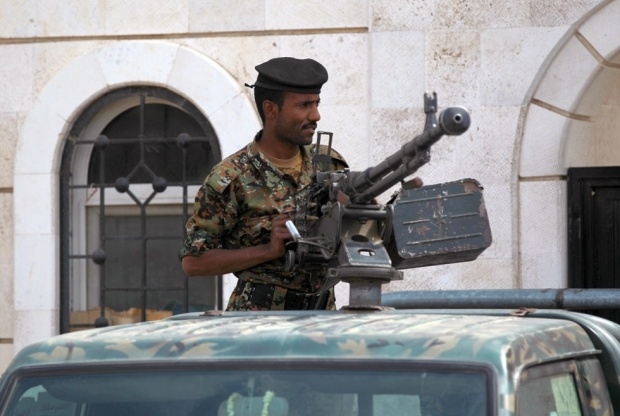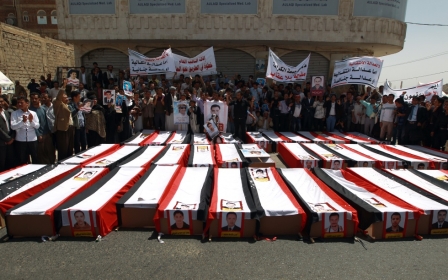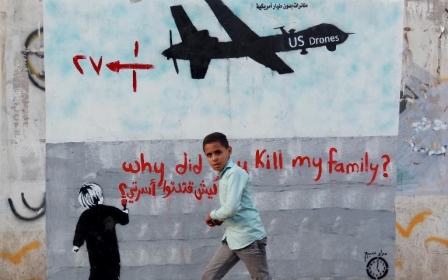9 killed in clashes between army and 'al-Qaeda militants' in Yemen

Yemen's military clashed with suspected al-Qaeda militants, who had fled an army offensive in the south, in a district near the capital Sanaa on Sunday, killing six troops and three fighters, security and tribal sources told the AFP.
Two overnight drone strikes targeted al-Qaeda suspects in Wasl, a village in Arhab, 20 kilometres (12 miles) north of Sanaa, tribal sources in the area told AFP. Militants fled the drone attacks to a nearby village, Ozer, where Yemeni troops launched a ground attack, according to sources.
A security official said Yemeni anti-terrorism forces killed three Al-Qaeda militants and arrested four others. The tribal sources told AFP that six members of Yemen's special forces also died in the fighting.
A further 12 al-Qaeda suspects – eight Saudis and four Yemenis – were said to have been arrested by soldiers, sources told AFP.
The army has now sealed off the Arhab area, they added.
New MEE newsletter: Jerusalem Dispatch
Sign up to get the latest insights and analysis on Israel-Palestine, alongside Turkey Unpacked and other MEE newsletters
The sources said the suspects had fought in late 2011 in Syria, where foreign militants have joined rebel fighters attempting to overthrow President Bashar al-Assad.
The militants returned to Yemen and were in Al-Qaeda's southern bastions of Shabwa and Abyan before an army offensive launched on April 29 drove them out to Arhab, they said.
The army says it inflicted heavy losses on Al-Qaeda in the offensive but analysts say the gains may have been the result of a tactical retreat by Al-Qaeda in coordination with powerful tribes.
Washington has stepped up drone attacks against al-Qaeda in the Arabian Peninsula (AQAP) leaders.
Hundreds have been killed by American airstrikes in southern Yemen since 2002, with a string of large scale attacks last month estimated to have killed some 60 fighters although independent confirmation of the casualties has been slow to materialise.
Human rights groups have widely condemned the use of drones and say that these kinds of attacks help to create resentment, which in turn helps AQAP to recruit more fighters.
“Drone strikes might kill one or two AQAP members, but for every person they kill they are creating a recruitment pool of 10 new members,” Segav Kechichian, Yemen researcher at Amnesty International, told MEE last month.
Local activists agree and say drone strikes have added to the ranks of AQAP.
“Many people have joined al-Qaeda to seek revenge for their relatives,” Farea al-Muslimi, Yemeni writer and youth activist said. “There is a new generation of AQAP and it consists of brothers – mostly – of those who were killed by US drones”.
Late on Saturday, Yemeni warplanes raided the home of a suspected militant in Arhab who had also returned from Syria, the local sources told AFP.
They reported casualties, without giving figures, and said the house was damaged and two cars were destroyed.
The army continues to fight al-Qaeda across the country, having recaptured several major towns in 2012, but has struggled to reassert control in rural areas despite recruiting militia allies among local tribes.
Middle East Eye delivers independent and unrivalled coverage and analysis of the Middle East, North Africa and beyond. To learn more about republishing this content and the associated fees, please fill out this form. More about MEE can be found here.




